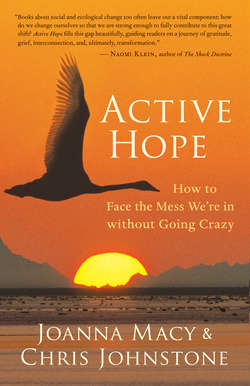Читать книгу Active Hope - Joanna Macy - Страница 10
На сайте Литреса книга снята с продажи.
Introduction
Оглавление“Dangerous,” “frightening,” “out of control” — as we go around the room, people are calling out the word or phrase that comes to mind as they complete this sentence: “When I consider the condition of our world, I think things are getting…” Over the last few decades, we’ve done this process with tens of thousands of people in a wide range of settings. The responses we hear echo survey findings that show high levels of alarm about the future we’re heading into.1
Such widespread anxiety is well-founded. As our world heats up, deserts expand and extreme weather events become more common. Human population and consumption are increasing at the same time as essential resources, such as freshwater, fish stocks, topsoil, and oil reserves, are in decline. While reversals in the economy have left many feeling desperate about how they’re going to manage, trillions of dollars are spent on the making of war.2 Given these adversities, it is no surprise if we experience a profound loss of confidence in the future. We can no longer take it for granted that the resources we’re dependent on — food, fuel, and drinkable water — will be available. We can no longer take it for granted even that our civilization will survive or that conditions on our planet will remain hospitable for complex forms of life.
We are starting out by naming this uncertainty as a pivotal psychological reality of our time. Yet because it is usually considered too depressing to talk about, it tends to remain an unspoken presence at the backs of our minds. Sometimes we’re aware of it. We just don’t mention it. This blocked communication generates a peril even more deadly, for the greatest danger of our times is the deadening of our response.
We often hear comments such as “Don’t go there, it is too depressing” and “Don’t dwell on the negative.” The problem with this approach is that it closes down our conversations and our thinking. How can we even begin to tackle the mess we’re in if we consider it too depressing to think about?
Yet when we do face the mess, when we do let in the dreadful news of multiple tragedies unfolding in our world, it can feel overwhelming. We may wonder whether we can do anything about it anyway.
So this is where we begin — by acknowledging that our times confront us with realities that are painful to face, difficult to take in, and confusing to live with. Our approach is to see this as the starting point of an amazing journey that strengthens us and deepens our aliveness. The purpose of this journey is to find, offer, and receive the gift of Active Hope.
